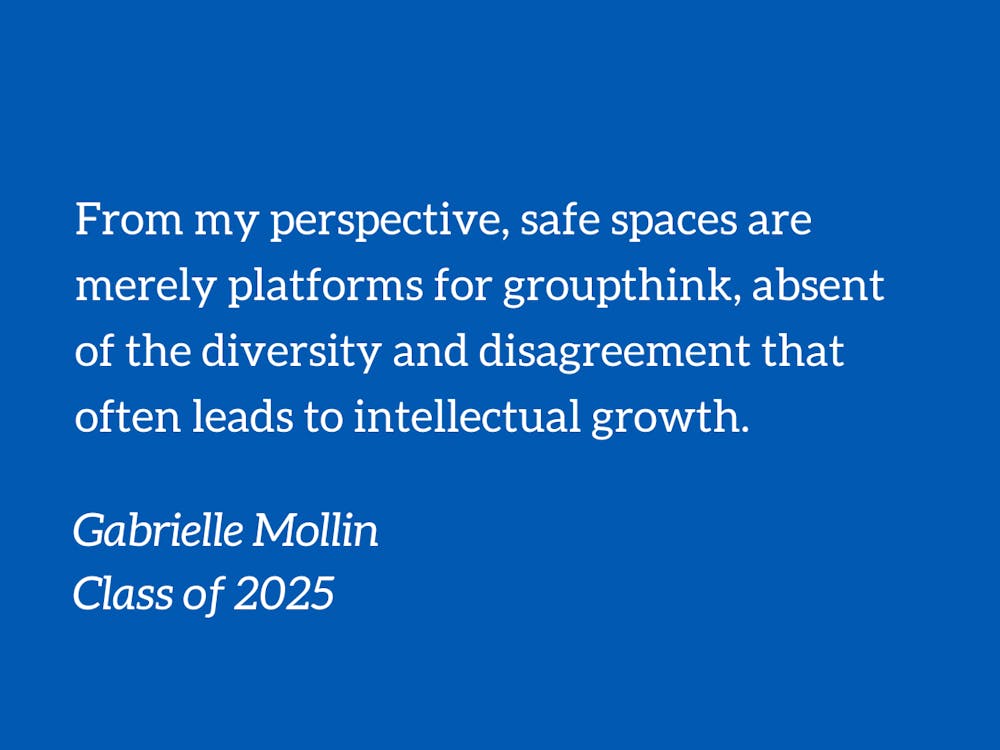Did you know that Duke’s Sanford School of Public Policy has a dedicated “safe space?” Located in a former office in Rubenstein Hall, the safe space is a “respite from discourse that can be demeaning, antagonistic or fraught.” The idea of the “safe space” — physical or metaphorical — is certainly no stranger on college campuses, including Duke. Administrators, professors and student leaders alike devote themselves to maintaining this safe space, supposedly keeping people happy, comfortable and (most importantly) safe. I must admit, however, that the ubiquitous reliance on “safe spaces” throughout Duke’s campus doesn’t leave me with so much of a warm, cozy feeling, but more of a persistent frustration.
The surface-level notion of a safe space doesn’t seem all that controversial. Students should be confident that their classrooms are free from discrimination, harassment and any sort of severe physical or emotional harm. This kind of safe space should absolutely be a campus priority.
Yet in actuality, the “safe space” is an unfortunate oxymoron. A safe space doesn’t necessarily signal community and comfort, but rather censorship and anxiety. From my perspective, safe spaces are merely platforms for groupthink, absent of the diversity and disagreement that often leads to intellectual growth. You are safe if you follow the pre-ordained discussion checklist. But if you deviate from the norm, not only have you made the “safe space” unsafe, but now you yourself are also unsafe in the “safe space.” Safe spaces function under the guise of protection from harm, but they functionally shelter students from genuine truth and disagreement while simultaneously stoking anxiety about openly voicing opinions.
This contrived notion of a safe space could not be further from the comfort and freedom I felt in my political polarization class last semester with Professor John Rose. Throughout the semester, our class ventured into the depths of political debate, delving into contentious topics like abortion, affirmative action, gender identity and pronouns to build community, understanding and respect amid political disagreement. In an alarmingly binary political culture that consistently stifles open debate and denies the plausibility of bipartisan friendship, I found this class utterly refreshing. I raved to my friends and family about the sense of community in the classroom — despite the political variance — and the absolute emphasis on free speech in stark contrast to some of my other political science and public policy classes.
During each class, without fail, students would share their truthful opinions. And they did so because they knew that the classroom was truly safe. Not safe in the typical university sense, but safe due to the assumption of good faith. Our classroom was able to flourish into the world of free and open debate because everyone in that classroom believed everyone was well-intentioned. We had to listen with our hearts, not just our heads. We had to understand where one another was coming from. We had to see each other as people, not political caricatures. We had to hear things that made us uncomfortable, angry and upset.
We had to feel unsafe to truly be safe.
My dad likes to joke that this class I held in such high regard was really just class back in his day. And as much as I want to prove him wrong, he has a point that this course shouldn’t be as revolutionary as I’m making it out to seem. A political science course should have discourse from across the political spectrum and should feel uncomfortable and controversial at times. It should not be safe, and Professor Rose’s class should not be an exception to the norm of safe spaces in classrooms but an exemplar of a new norm for open and honest debate.
To many, the prospect of an academic space with complete and utter free speech on an elite college campus in 2024 still seems wholly delusional. Yet somehow, PoliSci 208 achieved that. And to me, that is the ultimate safe space.
Gabrielle Mollin is a Trinity sophomore. Her columns typically run on alternate Thursday's.
Get The Chronicle straight to your inbox
Sign up for our weekly newsletter. Cancel at any time.

